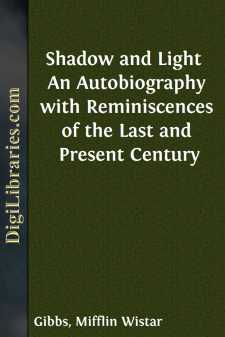Categories
- Antiques & Collectibles 13
- Architecture 36
- Art 48
- Bibles 22
- Biography & Autobiography 813
- Body, Mind & Spirit 142
- Business & Economics 28
- Children's Books 15
- Children's Fiction 12
- Computers 4
- Cooking 94
- Crafts & Hobbies 4
- Drama 346
- Education 46
- Family & Relationships 57
- Fiction 11829
- Games 19
- Gardening 17
- Health & Fitness 34
- History 1377
- House & Home 1
- Humor 147
- Juvenile Fiction 1873
- Juvenile Nonfiction 202
- Language Arts & Disciplines 88
- Law 16
- Literary Collections 686
- Literary Criticism 179
- Mathematics 13
- Medical 41
- Music 40
- Nature 179
- Non-Classifiable 1768
- Performing Arts 7
- Periodicals 1453
- Philosophy 64
- Photography 2
- Poetry 896
- Political Science 203
- Psychology 42
- Reference 154
- Religion 513
- Science 126
- Self-Help 84
- Social Science 81
- Sports & Recreation 34
- Study Aids 3
- Technology & Engineering 59
- Transportation 23
- Travel 463
- True Crime 29
Shadow and Light An Autobiography with Reminiscences of the Last and Present Century
Categories:
Description:
Excerpt
CHAPTER I.
In the old family Bible I see it recorded that I was born April 17, 1823, in Philadelphia, Pa., the son of Jonathan C. Gibbs and Maria, his wife. My father was a minister in the Wesleyan Methodist Church, my mother a "hard-shell" Baptist. But no difference of religious views interrupted the even tenor of their domestic life. At seven years of age I was sent to what was known as the Free School, those schools at that time invaluable for colored youth, had not graded studies, systematized, and with such accessories for a fruitful development of the youthful mind as now exist. The teacher of the school, Mr. Kennedy, was an Irishman by birth, and herculean in proportions; erudite and severely positive in enunciation. The motto "Spare the rod and spoil the child" had no place in his curriculum. Alike with the tutors of the deaf and the blind, he was earnest in the belief that learning could be impressively imparted through the sense of feeling. That his manner and means were impressive you may well believe, when I say that I yet have a vivid recollection of a bucket with an inch or two of water in it near his desk. In it stood an assortment of rattan rods, their size when selected for use ranging in the ratio of the enormity, of the offence or the age of the offender.
Among the many sterling traits of character possessed by Mr. Kennedy was economy; the frequent use of the rods as he raised himself on tiptoe to make his protest the more emphatic—split and frizzled them—the immersion of the tips in water would prevent this, and add to the severity of the castigation, while diminishing the expense. A policy wiser and less drastic has taken the place of corporal punishment in schools. But Mr. Kennedy was competent, faithful and impartial. I was not destined to remain long at school. At eight years of age two events occurred which gave direction to my after life. On a Sunday in April, 1831, my father desired that the family attend his church; we did so and heard him preach, taking as his text the 16th verse of Chapter 37 in Genesis: "I seek my brethren; tell me, I pray thee, where they feed their flocks."
On the following Sunday he lay before the pulpit from whence he had preached, cold in death, leaving my mother, who had poor health, with four small children, and little laid by "for a rainy day." Unable to remain long at school, I was "put out" to hold and drive a doctor's horse at three dollars a month, and was engaged in similar employment until I reached sixteen years of age. Of the loving devotion and self-sacrifice of an invalid mother I have not words to express, but certain it is, that should it ever appear that I have done anything to revere, or aught to emulate, it should be laid on the altar of her Christian character, her ardent love of liberty and intense aspiration for the upbuilding of the race. For her voice and example was an educator along all the lines of racial progress.
Needing our assistance in her enfeebled condition, she nevertheless insisted that my brother and myself should learn the carpenter trade....


